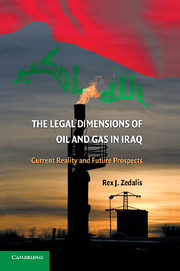Book contents
- Frontmatter
- Contents
- Foreword
- Acknowledgments
- Prologue
- PART ONE THE CONTEXTUAL BACKGROUND
- PART TWO THE COMPLICATIONS ASSOCIATED WITH IRAQI LEGISLATIVE MEASURES
- 3 Federal Oil and Gas Framework Law and Subcentral Government Responses
- 4 A Primer on the Federal Model Exploration and Production Contracts and the Kurdistan Regional Government's Model Production-Sharing Contract
- 5 The Federal Oil and Gas Revenue-Sharing Law: Its Many Problems
- 6 Measures to Reconstitute the Iraq National Oil Company (INOC) and Reorganize the Ministry of Oil
- PART THREE CURRENT ISSUES AND POTENTIAL FUTURE PROBLEMS
- Epilogue
- Index
5 - The Federal Oil and Gas Revenue-Sharing Law: Its Many Problems
Published online by Cambridge University Press: 07 December 2009
- Frontmatter
- Contents
- Foreword
- Acknowledgments
- Prologue
- PART ONE THE CONTEXTUAL BACKGROUND
- PART TWO THE COMPLICATIONS ASSOCIATED WITH IRAQI LEGISLATIVE MEASURES
- 3 Federal Oil and Gas Framework Law and Subcentral Government Responses
- 4 A Primer on the Federal Model Exploration and Production Contracts and the Kurdistan Regional Government's Model Production-Sharing Contract
- 5 The Federal Oil and Gas Revenue-Sharing Law: Its Many Problems
- 6 Measures to Reconstitute the Iraq National Oil Company (INOC) and Reorganize the Ministry of Oil
- PART THREE CURRENT ISSUES AND POTENTIAL FUTURE PROBLEMS
- Epilogue
- Index
Summary
INTRODUCTION
It almost goes without saying that nations which find themselves blessed by the fates with substantial deposits of extremely desired and, thus, highly valuable natural resources often encounter great difficulty in managing their exploitation and handling the financial benefits that flow from tapping that bounty. Even among nations that are seeming exceptions to that general proposition, the past makes clear that only great abuse and struggle have helped them evolve to wiser ways. To a certain extent, nature almost does a country a favor in withholding her largesse and compelling its people to scratch a living from the bare bones of their own ingenuity and determination. Virtually everyone cognizant of the ways of the world is familiar with how many natural resource rich nations seem to translate raw mineral wealth into exploitation incompetence, sheer ruling-class or ruling-family greed, or political despotism and entailed perpetual power. The likes of Nigeria, Sudan, Myanmar, and untold others spring readily to mind. All remind us that, if a chance exists to get in at the ground level and shape the character and contours of a natural resource revenue-sharing law, several major areas absolutely must be addressed.
The areas that definitely require attention in any seminal effort to shape a natural resource revenue-sharing law include those involving clarity with respect to both the collection triggers and to the distribution formula itself.
- Type
- Chapter
- Information
- The Legal Dimensions of Oil and Gas in IraqCurrent Reality and Future Prospects, pp. 138 - 170Publisher: Cambridge University PressPrint publication year: 2009



